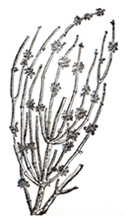
Ephedra
Introduction
This fact sheet provides basic information about the herb plant or part of a plant used for its flavor, scent, or potential therapeutic properties. Includes flowers, leaves, bark, fruit, seeds, stems, and roots. ephedra-common names, uses, potential side effects, and resources for more information. Ephedra is an evergreen shrub-like plant native to Central Asia and Mongolia. The principal active ingredient, ephedrine, is a compound that can powerfully stimulate the nervous system and heart.
Common Names
ephedra, Chinese ephedra, ma huang
Latin Names
Ephedra sinica
What It Is Used For
- Ephedra has been used for more than 5,000 years in China and India to treat conditions such as colds, fever, flu, headaches, asthma, wheezing, and nasal congestion.
- It has also been an ingredient in many dietary supplements used for weight loss, increased energy, and enhanced athletic performance.
How It Is Used
The dried stems and leaves of the plant are used to create capsules, tablets, extracts, tinctures, and teas.
What the Science Says
- An NCCAM-funded study that analyzed phone calls to poison control centers found a higher rate of side effects from ephedra, compared with other herbal products.
- Other studies and systematic reviews have found an increased risk of heart, psychiatric, and gastrointestinal problems, as well as high blood pressure and stroke, with ephedra use.
- According to the U.S. Food and Drug Administration (FDA), there is little evidence of ephedra's effectiveness, except for short-term weight loss. However, the increased risk of heart problems and stroke outweighs any benefits.
Side Effects and Cautions
- In 2004, the FDA banned the U.S. sale of dietary supplements containing ephedra. The FDA found that these supplements had an unreasonable risk of injury or illness-particularly cardiovascular complications-and a risk of death. The ban does not apply to traditional Chinese herbal remedies or to products like herbal teas regulated as conventional foods.1
- Between 1995 and 1997, the FDA received more than 900 reports of possible ephedra toxicity. Serious adverse events such as stroke, heart attack, and sudden death were reported in 37 cases.
- Using ephedra may worsen many health conditions such as cardiovascular disease, kidney disease, sleep disorders, and diabetes.
- Taking ephedra can also result in nausea, anxiety, headache, psychosis, kidney stones, tremors, dry mouth, irregular heart rhythms, heart damage, high blood pressure, restlessness, sleep problems, irritation of the stomach, and increased urination.
- Women who are pregnant or breastfeeding and children should avoid taking ephedra.
- Ephedra use may lead to serious health problems when used with other dietary supplements or medicines.
- Combining ephedra with caffeine increases the risk of potentially serious side effects.
- Tell your health care providers about any complementary and alternative practices you use. Give them a full picture of what you do to manage your health. This will help ensure coordinated and safe care.
1 Products regulated as drugs that contain chemically synthesized ephedrine are not dietary supplements and are not covered by this rule. These include drugs used for the short-term treatment of asthma, bronchitis, and allergic reactions.
Sources
- National Center for Complementary and Alternative Medicine. Ephedra. National Center for Complementary and Alternative Medicine Web site. Accessed on July 9, 2007.
- Ephedra (Ma Huang). In: Coates P, Blackman M, Cragg G, et al., eds. Encyclopedia of Dietary Supplements. New York, NY: Marcel Dekker; 2005:189-195.
- Ephedra (Ephedra sinica)/Ma huang. Natural Standard Database Web site. Accessed on July 3, 2007.
- Ephedra. In: Blumenthal M, Goldberg A, Brinckman J, eds. Herbal Medicine: Expanded Commission E Monographs. Newton, MA: Lippincott Williams & Wilkins; 2000:110-117.
- Ephedra. Natural Medicines Comprehensive Database Web site. Accessed on July 6, 2007.
- NCCAM National Institutes of Health







